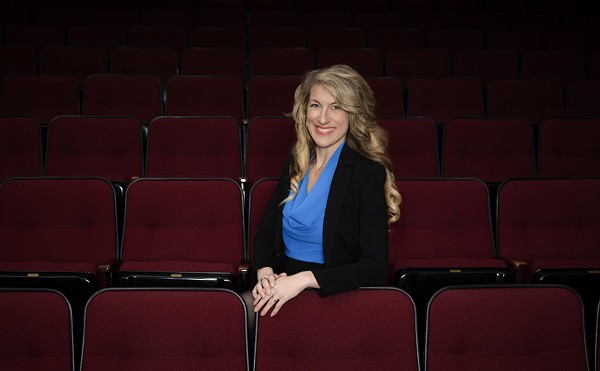In short, it's bad.
That other states, including Illinois, are in worse shape is little consolation: Missouri government must take drastic steps to balance a recession-battered budget.
"I had 25 people outside my office just now, and they are getting their monthly general-relief-fund payment cut from $80 to $9," says Mary Still, the governor's spokeswoman.
"That's a very difficult choice to make. There are many, many difficult choices being made right now."
Among those choices that must be made, Holden wants to cut state support for the Missouri Arts Council and dip into the state's Cultural Trust Fund. From $5.9 million this year, Holden's budget proposal reduces the state's appropriation to zero in fiscal year 2004. That means arts organizations are going to have to look elsewhere for funding, and in the current economy they're already dealing with fewer philanthropic dollars.
"The governor would like to have more money and would like to be able to fund the arts council," says Still, but amidst those many difficult choices, the story of those people outside her office contains an obvious lesson. Shelter, food, clothing, health care, education -- these basic services are in peril. And you want to talk about the Missouri Arts Council?
Noree Boyd, executive director of MAC, has been meeting with legislators and community groups since she first saw the big zero next to her organization's name in the governor's budget. She sympathizes with the dilemma facing the General Assembly.
"We have a lot of friendly legislators," Boyd says. "They're all saying, 'Oh, you know I love the arts. You know I support the arts. You know I do everything I can for the arts. But there's a huge budget deficit, a huge nut to crack, and we've got to be good stewards of public dollars.'
"We certainly understand that, and we certainly understand that there are a lot of needs around the state. We believe and know the arts can help sooth some of those needs as well -- in education, in business attraction, etc."
But there's no money.
Boyd and longtime arts lobbyist Kyna Iman are making the pitch to this new Legislature that funding the arts is an investment. "We're going to make the case on how important the arts are to economic development," Iman says. "With this conservative Legislature, they understand that. The arts can turn a dollar faster than any other program," she says.
Wait a minute. With many new faces in this Legislature, and not so many friendly faces as MAC used to see, do you really think they get that? "We're trying to educate them along those lines," says Iman. "We're working very hard to educate them on that."
That education requires more than the usual explanation of the values of cultural tourism, arts education and the fact that life without the arts is dull, dull, dull. How dull can it be? Unless your aunt lives there or the state fair is taking place, there's no reason to go to Sedalia other than to visit the Daum Museum of Contemporary Art. Even the New York Times brought attention to Missouri with regard to something other than a predilection for Confederate flags: The paper of record claimed the state had an uncharacteristic affinity for contemporary art. A dubious assertion, but don't tell the tourists that. Even a Republican Legislature and a sorely pressed Democratic governor understand that the arts are revenue-makers.
Maybe.
With state dollars hard to come by to keep even a roadside rest area clean, an even greater danger than zero funding to MAC is Holden's proposed dipping into the state's Cultural Trust to fund the agency this year. There is such a thing as a Cultural Trust in Missouri, and it's a model for combining public and private funding to stabilize the arts in perpetuity, at least in theory.
When is a trust not a trust? When you take money out of it for something other than what it was intended -- which is what Holden is proposing, and which probably isn't even legal. Says Iman, "We do not have the authority to spend those dollars. They've been invested in an endowment -- that's what you do with an endowment.
"[Holden] was even state treasurer when a majority of those funds were put into the Missouri investment trust. We'll be highly penalized if we take any money out of that fund to use."
Established in 1996 by state statute, the Cultural Trust is made up of revenues derived from the taxation of nonresident performers and athletes. The impetus of the trust's creation came from those Republicans who demanded that arts organizations find more of their own funding sources -- the private/public partnership model that the Reagan era gave us.
So, in Missouri, the arts groups did just as they were told. They raise money to go into a private trust, and the state puts in tax dollars gathered from non-Missourians to match it. By 2008, the trust was to reach $100 million, and all would be stabilized for generations to come.
Yet even when artists do as they're told, they get zeroed. The Legislature has failed to put those dollars into the trust for two years, ignoring the state statute. Moreover, tax dollars from professional athletes living in Johnson County, Kansas -- the Chiefs and Royals who reside across the border from Kansas City -- haven't been figured into the revenue stream, meaning that millions slated for the Trust have been lost.
State Representative Kathlyn Fares (R-St. Louis County) has introduced a bill that would extend the deadline for the Trust to reach $100 million to 2015, which would help, if the Legislature would ever pay into the trust again.
But even if MAC could dip into the Cultural Trust for its 2004 budget, the agency could lose almost a million dollars from a National Endowment for the Arts grant. Iman says she's received a letter from the NEA informing her that the feds won't provide grant money unless there are matching funds from the state coming from general revenue. Zero investment leads to zero return.
Representative Barbara Fraser (D-St. Louis County), a member of the budget committee, is not shy about referring to herself as "a strong advocate for the arts." She says her goal is to find other money to fund MAC, and "not to accept that savings are the only way of getting us out of this terrible crisis.
"I absolutely think that we need to retain that funding. We need to find a way to get general-revenue money into the Arts Council.
"But I understand a billion dollars cut from the budget is a huge amount of money. These are terrible budgetary times, and many things will be cut."
Amidst all the hand-wringing and cries of desperation, you won't hear any legislator talking about the Hancock Amendment, an idiot child of the tax-revolt days that has helped put the state in the situation it's in. Remember those tax surpluses? Remember that check for $1 or so you got from the state? Those tax surpluses went back to the people, as the Hancock Amendment demands, and now the state is a billion dollars in the hole.
Most of the states are in deep trouble, and most of them don't have a Hancock Amendment. But most did have surpluses a few years ago, and most slept and dreamed the peaceful dreams of the never-ending boom economy.
Remember when your grandmother told you to save for a rainy day? Even conservatives should get this one. Doesn't "conserve" have something to do with what "conservative" means? Isn't there that story in the Bible about the king putting excess grain into storage because droughts happen, locusts happen, recessions happen?
The concept is downright artistic.





